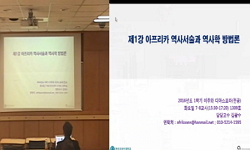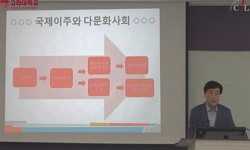Korea and China had experienced a great change after the liberation. This change has been reflected in politics, economic, society and culture. The wounds after the war, the collapse of moral and ethical, the chaos of politics Ideological and social a...
http://chineseinput.net/에서 pinyin(병음)방식으로 중국어를 변환할 수 있습니다.
변환된 중국어를 복사하여 사용하시면 됩니다.
- 中文 을 입력하시려면 zhongwen을 입력하시고 space를누르시면됩니다.
- 北京 을 입력하시려면 beijing을 입력하시고 space를 누르시면 됩니다.
부가정보
다국어 초록 (Multilingual Abstract)
Choi Inhun and Zhang Ailing are the representative writers of Korea and China during this period. Zhang Ailing's <Naked Earth> was published in 1950s which is earlier than the publication of Choi Inhun's <Square>. Choi Inhun published <Square> until 1960s, after the 4.19 revolution and the collapsing of Syngman Rhee’s regime. This is because under Syngman Rhee’s dictatorship, people in South Korea could not publish novels that depicting sensitive material. In addition, mainland China is ruled by the Communist Party and Taiwan is ruled by the Kuomintang, the literary and artistic activities both in mainland China and Taiwan cannot be free.
Especially Zhang Ailing's <Naked Earth> has Chinese and English versions.
Because the Chinese version was created with the support of the Hong Kong office of the United States Gazette while she stayed in Hong Kong for 3 years. Therefore, some scholars suspect whether the plot of the novel is true. But in 1956, when she revised the unreasonable content of the Chinese version and published the English version, Zhang Ailing was not assisted by the United States ,so she had free speech.
She not only deleted the propaganda materials but also diluted the political color in the English version. In addition, She paid more attention to the rational development of the storyline and the contradictions and struggles of the protagonist.
So that the horizon of the novel was broadened. Therefore, the author combines the Chinese version and the English version to analyze. Migration has been highly regarded by scholars as a new perspective in recent years. When it comes to migration, people often associate migration with the Western recognition of "space movement." In fact, migration includes not only the "space movement" but also the changes on thoughts and feelings. Migration is generally aimed at getting rid of oppression and pursuing a better life. After migration, it is possible to start a new life, on the other hand, they might be alienated or not be able to integrate into a new life. Most of the literary works contain migration. Choi Inhun and Zhang Ailing have gone through wars and both of them migrated because of the war. The war and migration have become the inevitable materials in their literary creation.
Because they have experienced the fear and the pain during the war and they understand the cruelty and scars of war more than anyone, so they are able to describe the pain of life of contemporary people vividly. These two novels reflected the social phenomenon in Korea and China. There are many similarities between these two novels. Particularly, <Naked Earth> contains the content of the Korean War, which triggered the author's desire to explore the relationship between Zhang Ailing and South Korea. It is an opportunity to understand the current situation of communication between South Korea and China in the modern period and seek sits historical experience. In <Square>, Li Mingjun is disappointment with South Korea’s life and moved to North Korea, hoping that the people’s country can make him feel peaceful. However, North Korea is also disappointing. In <Naked Earth>, Liu Quan moved to the countryside and city at the request of the state. After suffering a painful life, he decided to participate in the Korean War to seek inner peace. Due to the painful life and the oppression of the external society, both Li Mingjun and Liu Quan tried to find a spiritual sustenance in love. However, with the death of EunHye and the unfortunate fate of Huang Juan, they were disheartened. In the repatriation of prisoners of war, Li Mingjun chose to go to the neutral country and jumped int...
Korea and China had experienced a great change after the liberation. This change has been reflected in politics, economic, society and culture. The wounds after the war, the collapse of moral and ethical, the chaos of politics Ideological and social are fully integrated into literature and changed the literature.
Choi Inhun and Zhang Ailing are the representative writers of Korea and China during this period. Zhang Ailing's <Naked Earth> was published in 1950s which is earlier than the publication of Choi Inhun's <Square>. Choi Inhun published <Square> until 1960s, after the 4.19 revolution and the collapsing of Syngman Rhee’s regime. This is because under Syngman Rhee’s dictatorship, people in South Korea could not publish novels that depicting sensitive material. In addition, mainland China is ruled by the Communist Party and Taiwan is ruled by the Kuomintang, the literary and artistic activities both in mainland China and Taiwan cannot be free.
Especially Zhang Ailing's <Naked Earth> has Chinese and English versions.
Because the Chinese version was created with the support of the Hong Kong office of the United States Gazette while she stayed in Hong Kong for 3 years. Therefore, some scholars suspect whether the plot of the novel is true. But in 1956, when she revised the unreasonable content of the Chinese version and published the English version, Zhang Ailing was not assisted by the United States ,so she had free speech.
She not only deleted the propaganda materials but also diluted the political color in the English version. In addition, She paid more attention to the rational development of the storyline and the contradictions and struggles of the protagonist.
So that the horizon of the novel was broadened. Therefore, the author combines the Chinese version and the English version to analyze. Migration has been highly regarded by scholars as a new perspective in recent years. When it comes to migration, people often associate migration with the Western recognition of "space movement." In fact, migration includes not only the "space movement" but also the changes on thoughts and feelings. Migration is generally aimed at getting rid of oppression and pursuing a better life. After migration, it is possible to start a new life, on the other hand, they might be alienated or not be able to integrate into a new life. Most of the literary works contain migration. Choi Inhun and Zhang Ailing have gone through wars and both of them migrated because of the war. The war and migration have become the inevitable materials in their literary creation.
Because they have experienced the fear and the pain during the war and they understand the cruelty and scars of war more than anyone, so they are able to describe the pain of life of contemporary people vividly. These two novels reflected the social phenomenon in Korea and China. There are many similarities between these two novels. Particularly, <Naked Earth> contains the content of the Korean War, which triggered the author's desire to explore the relationship between Zhang Ailing and South Korea. It is an opportunity to understand the current situation of communication between South Korea and China in the modern period and seek sits historical experience. In <Square>, Li Mingjun is disappointment with South Korea’s life and moved to North Korea, hoping that the people’s country can make him feel peaceful. However, North Korea is also disappointing. In <Naked Earth>, Liu Quan moved to the countryside and city at the request of the state. After suffering a painful life, he decided to participate in the Korean War to seek inner peace. Due to the painful life and the oppression of the external society, both Li Mingjun and Liu Quan tried to find a spiritual sustenance in love. However, with the death of EunHye and the unfortunate fate of Huang Juan, they were disheartened. In the repatriation of prisoners of war, Li Mingjun chose to go to the neutral country and jumped int...
참고문헌 (Reference)
1 송현호, "한국현대문학에 나타난 이주담론의 인문학적 연구" 태학사 13-110, 2017
2 송현호, "한국현대 문학의 이주 담론 연구" 태학사 2017
3 송현호, "한국현대 문학의 이주 담론 연구" 태학사 237-257, 2017
4 김윤식, "한국소설사" 민음사 1992
5 김윤식, "한국문학사" 민음사 1982
6 송현호, "춘원의"사랑인가"에 나타난 이주담론의 연구" 3-29, 2017
7 송현호, "춘원의 이주담론에 대한 인문학적 연구" 한중인문학회 (51) : 23-42, 2016
8 梁淳阿, "최인훈의 『광장』 연구" 全北大學校 敎育大學院 1994
9 최인훈, "최인훈 전집1" 문학과 지성사 2016
10 서은혜, "이광수의 상해·시베리아행과 「유정」의 자서전적 텍스트성" 춘원연구학회 (9) : 223-256, 2016
1 송현호, "한국현대문학에 나타난 이주담론의 인문학적 연구" 태학사 13-110, 2017
2 송현호, "한국현대 문학의 이주 담론 연구" 태학사 2017
3 송현호, "한국현대 문학의 이주 담론 연구" 태학사 237-257, 2017
4 김윤식, "한국소설사" 민음사 1992
5 김윤식, "한국문학사" 민음사 1982
6 송현호, "춘원의"사랑인가"에 나타난 이주담론의 연구" 3-29, 2017
7 송현호, "춘원의 이주담론에 대한 인문학적 연구" 한중인문학회 (51) : 23-42, 2016
8 梁淳阿, "최인훈의 『광장』 연구" 全北大學校 敎育大學院 1994
9 최인훈, "최인훈 전집1" 문학과 지성사 2016
10 서은혜, "이광수의 상해·시베리아행과 「유정」의 자서전적 텍스트성" 춘원연구학회 (9) : 223-256, 2016
11 김병익, "숨은 진실과 문학" 문학과지성사 123-139, 1994
12 송현호, "문학이란 무엇인가 -춘원의 삶과 문학을 중심으로 -" 한국현대소설학회 (67) : 5-30, 2017
13 張愛玲, "赤地之戀" 시공사 2012
14 张爱玲, "浮华浪蕊, 惘然记" 台北皇冠文化出版有限公司 1983
15 乔幪, "流散作家的困境—中英文"赤地之恋"的比较研究" 12 : 112-117, 2017
16 김인철, "張愛玲의 反共小說―≪秧歌≫・≪赤地之戀≫" 중국인문학회 (28) : 297-314, 2004
17 김영화, "分斷狀況과 文學 : 崔仁勳의 「廣場」" 제주대학교 사범대학 국어교육과 국어교육연구회 49-61, 1987
18 张艳艳, "也谈《秧歌》与《赤地之恋》" 21-29, 2008
19 이언홍, "『유정』에 나타난 이주와 ‘정(情)’의 연구" 춘원연구학회 (8) : 109-133, 2015
20 송현호, "『무정』의 이주담론에 대한 인문학적 연구" 한국현대소설학회 (65) : 105-128, 2017
21 최선호, "『무정』에 나타난 디아스포라 의식" 춘원연구학회 (8) : 83-107, 2015
22 양녕, "「소년의 비애」와 「傷逝」에 나타난 이주 담론" 춘원연구학회 (12) : 147-174, 2018
23 송현호, "「삼봉이네 집」의 이주담론에 대한 인문학적 연구" 춘원연구학회 (9) : 167-190, 2016
24 张素梅, "《秧歌》和《赤地之恋》—农民的悲哀" 12 : 84-85, 2017
25 김동환, "1960년대 모더니즘 소설에 나타난 주체의 현실 대응 양상 : 최인훈의 『광장』을 중심으로" 아주대학교 교육대학원 2009
동일학술지(권/호) 다른 논문
-
- 춘원연구학회
- 송민호
- 2018
- KCI등재
-
- 춘원연구학회
- 박진숙
- 2018
- KCI등재
-
춘원 문학의 나르시시즘과 자전적 성격-「농촌계발」과 「민족개조론」을 중심으로
- 춘원연구학회
- 정홍섭
- 2018
- KCI등재
-
유동하는 텍스트(fluid text)와 북한 재현 양상-반디의 『고발』과 데보라 스미스(Deborah Smith)의번역 The Accusation을 중심으로
- 춘원연구학회
- 이지은
- 2018
- KCI등재





 DBpia
DBpia







